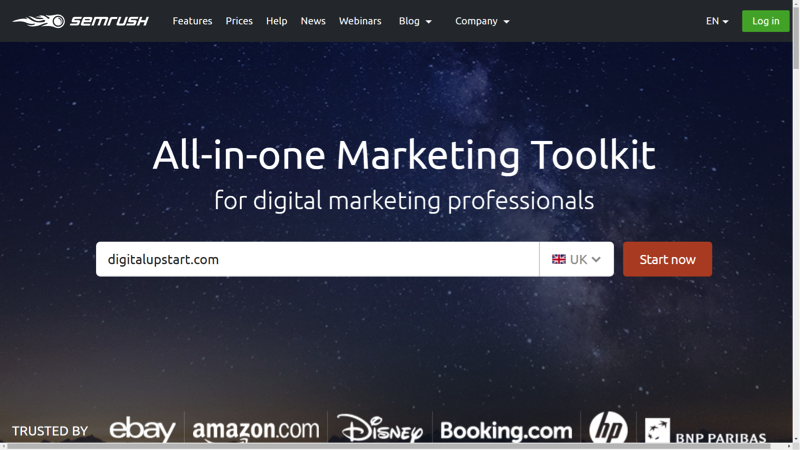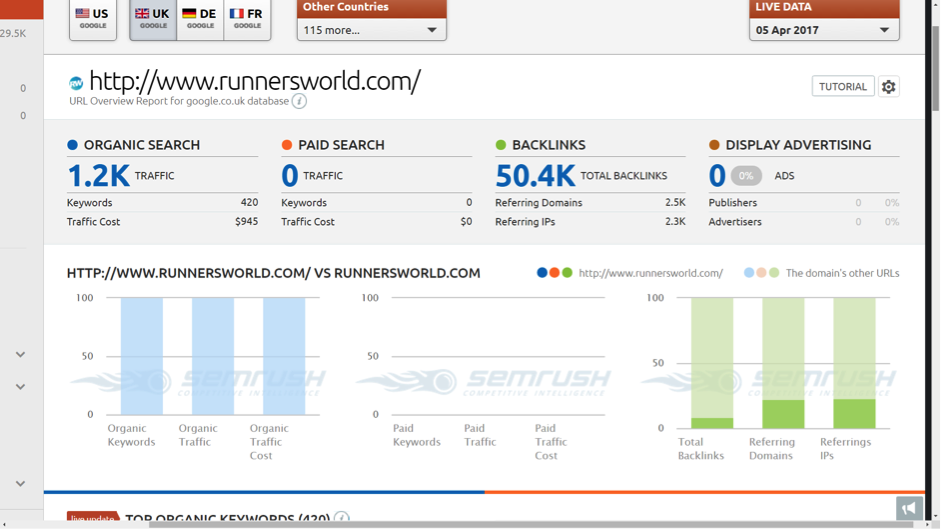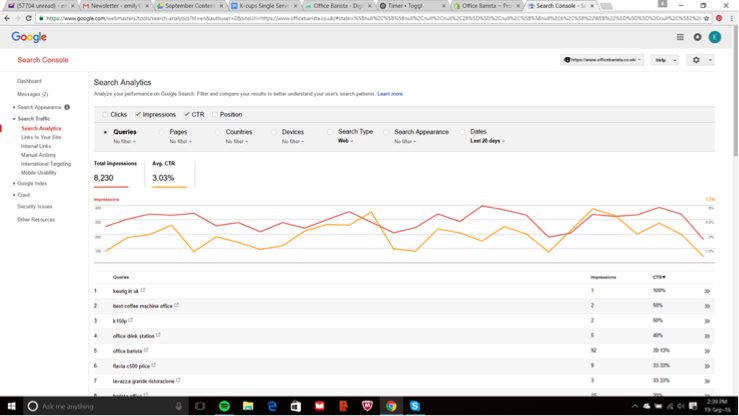A few weeks ago I asked the question…
Are you embarrassed by your website?
By that I meant…
Does it reflect the personality and quality of your business? Is it easy to navigate?
Does it do everything you want it to?
Is it getting you enough (or any) visitors, enquirers, subscribers and customers?
Right now there are customers out there looking for information, help, entertainment and advice and they need to find you.
But to get noticed and show that you’re credible and trustworthy, your website has to be right.
Today I thought I’d pass on some useful tools for analysing your website. These offer super smart X-ray like analytics to help you delve deeper into yours and your competitors’ stats.
Think of this as a quick fitness check.
Best of all, this is also a way to analyse your rivals’ websites too so you can see what kind of traffic they get, and from where.
First up…
Semrush
Semrush is an all-in-one marketing tool that works a bit like Google analytics.
Go to https://www.semrush.com/

You can type in a domain – either your own or that of a rival business.
For instance, let’s say you’ve an online business related to sports and fitness.
I’ll use the Runner’s World website as an example:

As you can see, there’s 1.2K website visitors coming from 420 keywords at a cost of $945.
That’s purely from organic searches.
While they’re not paying for Google searches, you can see they have an impressive number of backlinks – 50.4K.
Backlinks are one of the most important factors for rising up the search rankings. It shows how many other good quality websites are linking back to yours.
Semrush also allows you to drill down into which search terms are leading people to your site and which posts or pages are getting results.
You can get a load of searches on Semrush for free to check it out – but when you’ve used up your quota they’ll then ask you to pay, so make sure you try your own website first using this tool before you try it on competitors.
Next up…
Cognitive SEO
http://explorer.cognitiveseo.com/
On this Cognitive SEO you just paste in your website URL and click ‘explore links’.
In a few seconds it will create a user-friendly report which gives you stats about who’s linking to your site, from where, and pointing to which of your post of webpages. It even has graphs and diagrams to make it easy to understand.
Again, this will show who is backlinking to your site.
Google Webmaster Tools
Google has a console which shows you how your website ranks for certain keyword combinations.
Go to the Google search console here:
https://www.google.com/webmasters/tools/ and sign up for a free account.
You will need to enter your website or websites and then download a file which you then upload onto your site so that Google can verify you.??Once you’ve done that, you can start to see how well you’re doing in your search marketing and make tweaks to your strategy to boost results.
Here’s an example of how your page might look:

You can put all kinds of filters on it to research different results. It’s show you:
• The average number of clicks for a Google search.
• The number of page impressions.
• Get alerted to errors or problems.
• Test how well Google understands and rates your website content.
• Work out the locations of your top searchers.
While these tools are great shortcuts, you should also give your website a manual overview.
Your Website Health Checklist
Nobody (outside of Google HQ) knows precisely the criteria of Google’s search engine algorithms but a 2011 article by a Google employee Amit Singhal suggested the following elements a healthy website should have.
These undoubtedly remain true today and form a useful checklist so I’ve listed them here:
> Would you trust the information presented in this article?
> Is this article written by an expert or enthusiast who knows the topic well, or is it more shallow in nature?
> Does the site have duplicate, overlapping, or redundant articles on the same or similar topics with slightly different keyword variations?
> Would you be comfortable giving your credit card information to this site?
> Does this article have spelling, stylistic, or factual errors?
> Are the topics driven by genuine interests of readers of the site, or does the site generate content by attempting to guess what might rank well in search engines?
> Does the article provide original content or information, original reporting, original research, or original analysis?
> Does the page provide substantial value when compared to other pages in search results?
> How much quality control is done on content?
> Does the article describe both sides of a story?
> Is the site a recognised authority on its topic?
> Is the content mass-produced by or outsourced to a large number of creators, or spread across a large network of sites, so that individual pages or sites don’t get as much attention or care?
> Was the article edited well, or does it appear sloppy or hastily produced?
> For a health related query, would you trust information from this site?
> Would you recognise this site as an authoritative source when mentioned by name?
> Does this article provide a complete or comprehensive description of the topic?
> Does this article contain insightful analysis or interesting information that is beyond obvious?
> Is this the sort of page you’d want to bookmark, share with a friend, or recommend?
> Does this article have an excessive amount of ads that distract from or interfere with the main content?
> Would you expect to see this article in a printed magazine, encyclopaedia or book?
> Are the articles short, unsubstantial, or otherwise lacking in helpful specifics?
> Are the pages produced with great care and attention to detail vs. less attention to detail?
> Would users complain when they see pages from this site?
I hope this helps and if there are any tools you’d like to share with the community, please leave a comment below.
Want us to do all the hard work for you?
Right now we’re still offering 2 spaces available at a 50% discount on our Magi Sites service.
We create websites driven by proven direct response principles that are designed to help you:
• Find new customers
• Grow your email list
• Encourage more Social Media shares
• Drive more sales
• Showcase your strengths
If you think your business would benefit from having a beautiful, responsive and action-orientated website, click here.
